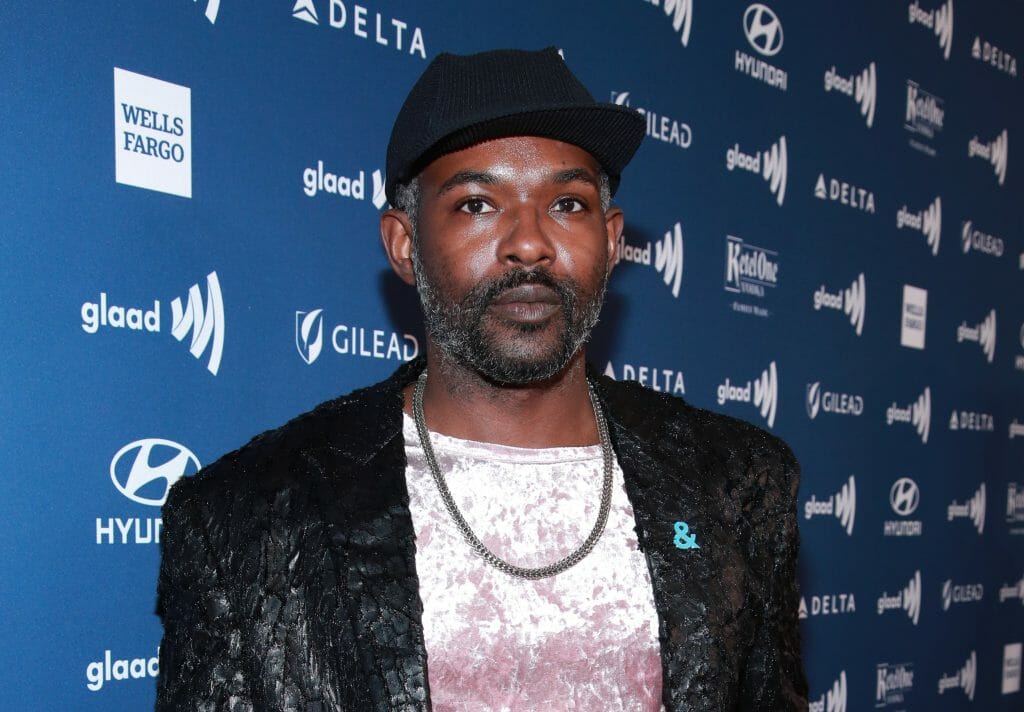Elegance Bratton is a director on the move who’s becoming very well-known these days in film festival circles. Ever since gaining wide acclaim in 2017 for his first short film, Walk For Me, Elegance has been making a huge name for himself as an emerging queer voice in independent film.
It hasn’t been an easy road. At age 16, Elegance was kicked out of his home for being gay and spent 10 years homeless before joining the Marines. While enrolled, he served as a combat camera production specialist in Camp H.M. Smith in Hawaii, shooting videos and taking photographs. He went on to graduate from Columbia University with a degree in African American Studies and from New York University’s Tisch School of the Arts with an MFA for directing and writing.
Elegance went on to be featured in the New York Times in 2018 and received his first GLAAD Media Award nomination for his Viceland series My House, which drew an even greater spotlight on ballroom culture in NYC. The show also won the Cannes Mipcom for diversity in television.
In 2019, Bratton debuted his first full-length feature documentary, Pier Kids, at Outfest, which opened to huge critical acclaim. Pier Kids also made a huge splash at DOC NYC this past November and is continuing to tour at festivals worldwide.
And next week, Bratton returns to the Sundance Film Festival with Buck, a live-action short that he wrote, directed, and produced along with Jovan James. We caught up with Elegance and Jovan ahead of Sundance to get the lowdown on everything going on in their flourishing careers.
(Buck at Sundance)
GLAAD: YOU’VE BEEN EXTREMELY BUSY LATELY! WHAT’S AN AVERAGE DAY BEEN LIKE FOR YOU OVER THE PAST SIX MONTHS OR SO?
Elegance: My main collaborator/love, Chester Algernal Gordon, and I have been on the road, airport to airport for the last six months, with Pier Kids. We’ve traveled to Outfest (LA), New Orleans, New Hampshire, Milwaukee, Toronto, and Doc NYC. Simultaneously, I’ve been focused on writing The Inspection, which is a 2019 Tribeca All Access grantee and a Film Independent Producing and Fastrack lab selection. Both labs were a great introduction to Hollywood. Most of all, they gave me a lot of faith that there are good people in this industry who believe that the true power of this medium is to make the world a more progressive place. Most days I spend a minimum of 8 hours writing and many more thinking out scenarios with my incredible team of collaborators.
Then there is post-production for Buck, my latest short, co-written & directed with Jovan James. This is our third film together and our first to play Sundance. I can’t believe I get to share this moment with the people I love and to whom I am closest! For the last six months, I’ve been walking in gratitude. I’ve been flirting with some good agents. So many of my days are comprised of meetings with some of the coolest people out there to find the right fit for my vision of the next phase of my career. At the same time, I’m taking multiple films around the festival circuit. I produce, write, and direct. Depending on which of those capacities I fulfill on any project can determine the flow of days as projects come to fruition and public awareness. If there is one word I can use to characterize the last six months I would say, “growth.” This moment right now is where the vision I had so many years ago is becoming real. It’s happening in so many unexpected ways and the impact upon my spirit is profound. I am so grateful to my many collaborators and supporters who’ve fought with me to bring the stories I tell to public attention. It is an overwhelming blessing to be at this moment and it wouldn’t be possible without this vast network of rebels, freaks, outcasts, tastemakers, and change-makers that I consider family.
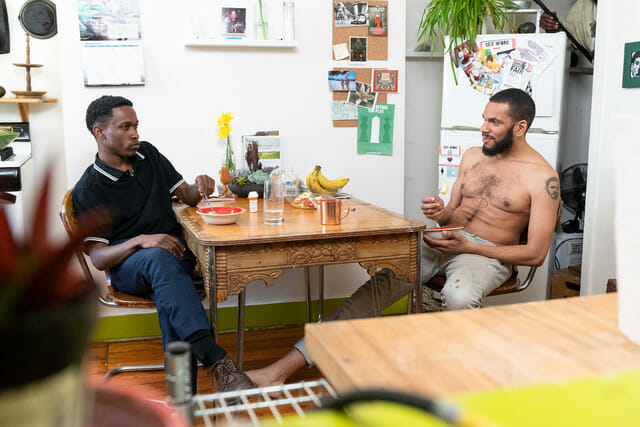
(a scene from Buck)
YOUR LIFE HAS BEEN AN AMAZING JOURNEY – GOING FROM HOMELESSNESS, TO THE MILITARY, TO COLUMBIA FILM SCHOOL, TO BECOMING AN AWARD-WINNING FILMMAKER; HOW HAS EVERYTHING LED UP TO WHERE YOU ARE NOW?
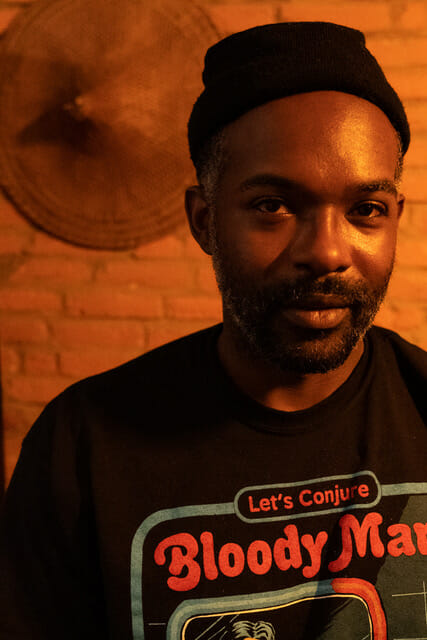 Elegance: Ha Ha. Columbia Grad Film rejected my application. Which I thought was weird considering that as an undergrad, Columbia (School of General Studies) student I took and excelled in many Graduate film courses. Oh well. I do, however, hold a bachelor’s degree in African American Studies & Anthropology from Columbia University. I hold a Master’s from NYU Tisch Grad Film in directing/writing. When you ask me to tell you how everything led up to where I am now, I’m not sure I have the perspective yet to answer. It’s overwhelming. I was one of those people that other people ignored… or at least that’s how I felt. People can just look through you sometimes and make you feel like nothing. To go from that aspect of life into the spaces I inhabit now leaves me with something that can only be described as psychic inertia. I am knocked out by the power of self-invention. I am grateful for where I am and look forward to accomplishing much more.
Elegance: Ha Ha. Columbia Grad Film rejected my application. Which I thought was weird considering that as an undergrad, Columbia (School of General Studies) student I took and excelled in many Graduate film courses. Oh well. I do, however, hold a bachelor’s degree in African American Studies & Anthropology from Columbia University. I hold a Master’s from NYU Tisch Grad Film in directing/writing. When you ask me to tell you how everything led up to where I am now, I’m not sure I have the perspective yet to answer. It’s overwhelming. I was one of those people that other people ignored… or at least that’s how I felt. People can just look through you sometimes and make you feel like nothing. To go from that aspect of life into the spaces I inhabit now leaves me with something that can only be described as psychic inertia. I am knocked out by the power of self-invention. I am grateful for where I am and look forward to accomplishing much more.
Within my body and mind, I carry with me the memory of so many different people I’ve met along the way. People who have housed me when I was without one of my own. Some who fed me and many who mentored me when I was at my lowest. I carry their stories and energy through the work that I make. When I was homeless I used to steal art books and re-sell them to mom and pop shops. It was thrilling and very exhausting. When the Marine recruiter asked me if I wanted to be a filmmaker, he had no idea that when I said “yes” it was because I’d read those stolen books about people like Spike Lee, Pedro Almodovar, John Casavettes, Wim Wenders, and so many others. He didn’t know that his question would ever lead to this. Neither did I. When I look back at this journey from being a homeless queer youth to being a filmmaker, I am truly humbled by the power of faith. A power made possible through the sacrifices of our Transcestors, and so many generations of queer people who’ve come before us.
WHAT MADE YOU AND JOVAN DECIDE TO WRITE AND DIRECT THE NEW SHORT FILM, BUCK?
Elegance: We wanted to tell a story from the perspective of a depressed young black gay man. So many people out there right now are turning to drugs and sex as a way to find joy in life. When we look at chem sex culture through the lenses of both class and race we see that there are wildly problematic power dynamics at play. Let’s face it. The Trump years have not been kind to us. So many people that I love are fighting to stay afloat, and here comes a guy like Ed Buck. He offers desperate young men an escape, only he doesn’t tell them he has a fetish for seeing them overdose. The power dynamics of sex are real. Each element of ourselves that is met with oppression in the daylight can still be at play in the bedroom. For some, this defines their sense of sexual play, and for others, this phenomenon is a yoke.
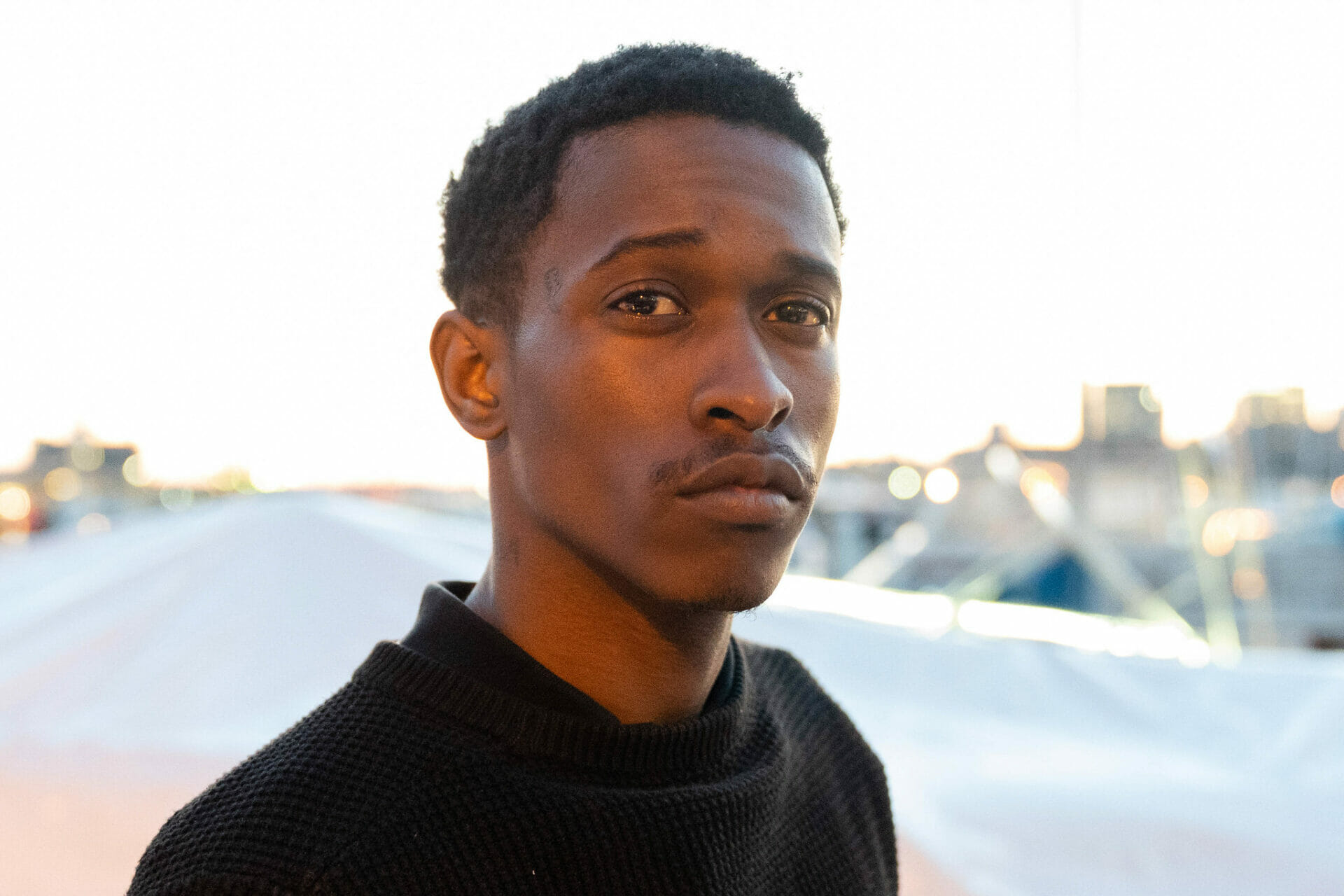
(Malik Shakur in Buck)
Buck is a film that sees the world through the eyes of Lynn a young gay Black man who’s in a depression and who turns to his older white lover for release… only to discover that for this man Lynn is the drug of choice. We wanted to make a film that explores the dynamics that bring young men like Gemmel Moore to predators like Ed Buck. Chem sex is nothing new. We are in an age where the CDC predicts that one out of two Black gay men will become HIV positive in their lifetimes. Forty percent of all homeless youth in America are LGBT and up to half are projected to be queer youth of color. Black men overall are experiencing unprecedented rates of suicide. We decided to make this film because we wanted to honor the lives of Gemmel Moore and Timothy Dean but also to suggest that there is something we have to learn from one another. There is a strange symmetry between rates of depression and HIV/AIDS for Black gay men. We wanted to explore the notion of a medicated generation and to show that there is hope in community. This film is greatly inspired by the friendship Jovan, Chester, and I share. It is a testimony to the capacity of human kindness.
Jovan: I looked at my community, and whether it was through personal conversations, social media, or reading the news, I saw that Black men — Black queer men specifically — are at a choking point when it comes to our mental health. As Black gay men, we face racism and homophobia simultaneously, our feelings and emotions frequently disregarded and ridiculed by a white, patriarchal society, even facing hatred from our own people. Many lack the resources to afford therapy or even can afford to take off work and attempt to have peace of mind, and so they are stuck in a downward spiral, a prisoner in their mind because no one knows, no one cares. Throughout my 20s, I have suffered from depression, and have spent years alternating between hiding my pain, and seeking help, occasionally acting out and being self-destructive. I began writing this story in an attempt to give life and a story to these issues, to allow a character to embody them so that others in the same situation could see themselves and perhaps feel some hope, even if it’s a little. When I learned of the story of Gemmel Moore, I was staying nearby in West Hollywood, I was touched and became obsessed with the story, particularly how it was ignored by the general public, even Black media. The more I read, the more I empathized with Gemmel, and I felt that I wasn’t very far from this reality. I felt it was right to incorporate his story into the film so that his story could be heard and his pain could be acknowledged. 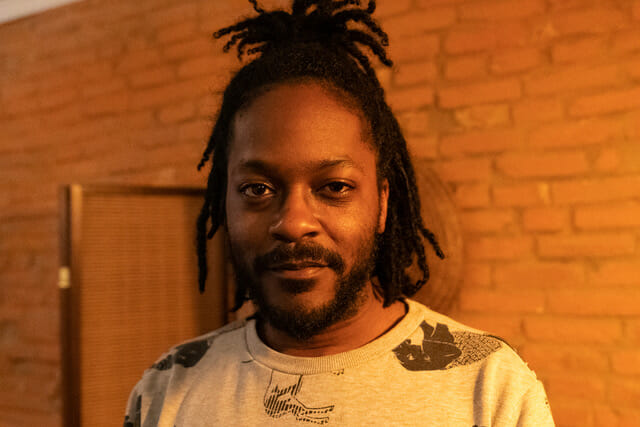
(Jovan James)
WHAT DO YOU HOPE AUDIENCES AT SUNDANCE WILL TAKE AWAY FROM WATCHING BUCK?
Elegance: This film wants audiences to take a moment and to see the world through the eyes of this new generation. We want to celebrate the power of our shared vulnerability through this film and show people that sometimes the greatest achievement is deciding to see another day. Moreover, we want people to acknowledge the absolute necessity of their neighbor. In an ideal scenario, people will see this film and call a friend they haven’t seen for a while. Maybe even go check up on someone who they think might need a kind ear to hear them.
Jovan: I hope it inspires people to have difficult conversations with their loved ones about mental health, but also about race and power in our society. There are thousands of people like Ed Buck across the country, getting away with unspeakable things we may never hear of. The view of the Black body as an object for use dates back to the era of slavery, and it is important to point out the similarities. These power dynamics affect us across the board, not just those on the fringes of society. I honestly see the protagonist almost as a guy next door, it could be you or I, maybe it is, you really never know what people are going through, and empathy and compassion can be so powerful if we choose to use it.
YOU PREMIERED YOUR DOCUMENTARY PIER KIDS AT OUTFEST THIS PAST SUMMER AND THEN IT’S BEEN ON THE FESTIVAL CIRCUIT EVER SINCE. WHAT’S THE NEXT STEP FOR THE FILM?
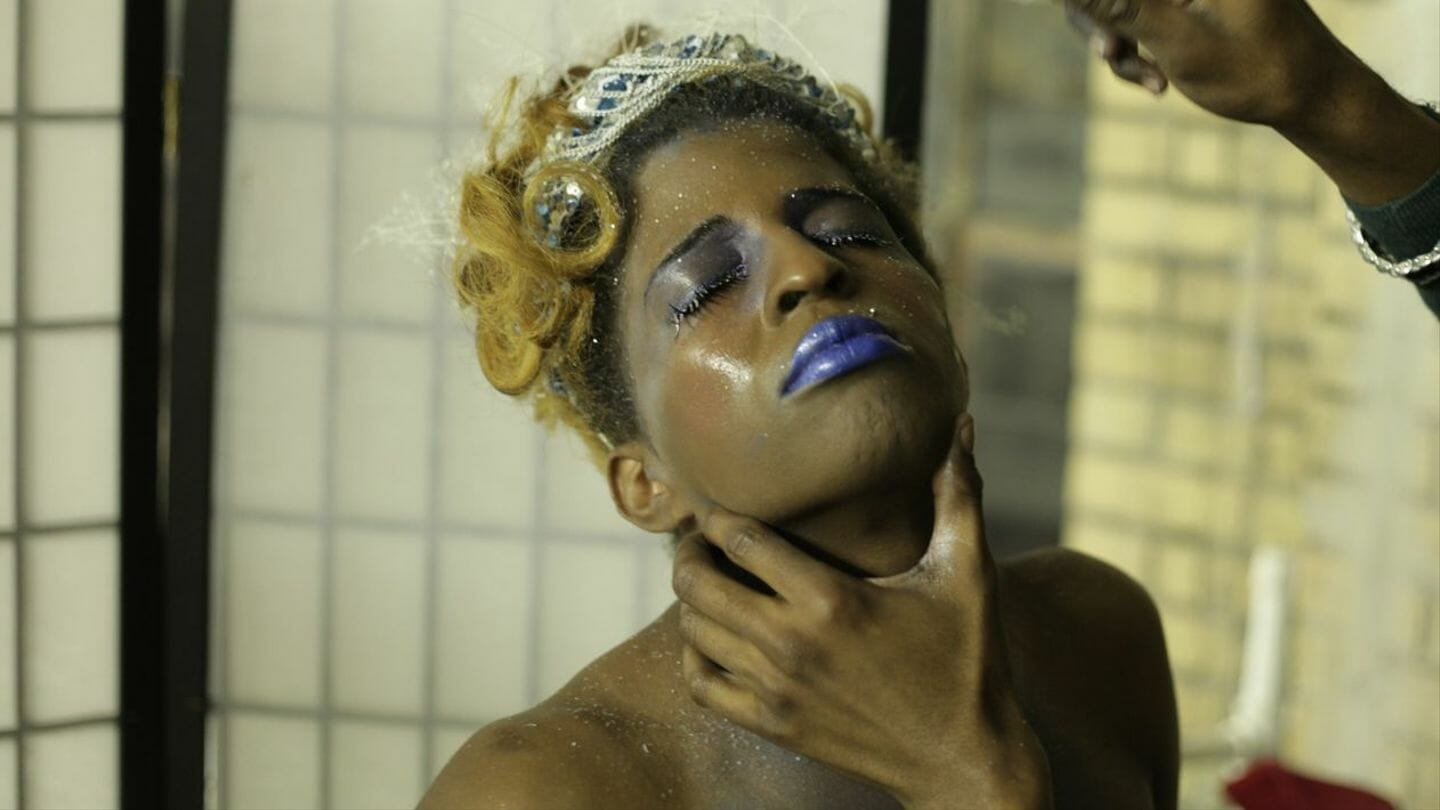
(Pier Kids)
Pier Kids will be making its way around the festival circuit throughout 2020. I have many great announcements but can’t say what they are yet. I will say that our programming journey has shown me the necessity of outsider LGBT programming at the highest levels. It’s not enough to tout statistics of inclusion. Any notion of inclusion of new and diverse voices must also embrace inclusivity around the ways stories are told. Documentary film on many levels is like hockey or golf. It’s one of the last bastions where one can reasonably expect to walk in a room and everybody is mostly straight, white, and male. Filmmakers of color, women, disabled, trans folks who tell stories about themselves are a rare commodity in these spaces. Yet so often these folks are the ones depicted on screen. It’s not for lack of content. I hope the top producers are out there looking for hard documentaries to make. The celebrity obsession has taken over the documentary world and I want to see the pendulum swing back to documentaries about the extraordinary everyday people that make our world so great.
At the moment, we are looking for a distribution deal for Pier Kids. Pier Kids is about one of the most influential communities in the history of the world, homeless queer youth of color. The film follows Casper, Krystal, and Desean as they use the iconic Christopher Street Pier in Manhattan’s West Village to find new families and stabilize their lives. More than half of America’s homeless are LGBT youth. This is an urgent issue but the story of making his film is in no small part one of facing the challenge of getting people to care enough to make sure the world sees the truth. I’m so grateful to the Tribeca Institute for helping me finish this film. I’m beyond grateful for the support shown to me by the festivals who’ve programmed and awarded the film. In the end, I want the film to play on a major streaming platform like MTV, HBO, Netflix, Hulu, etc. It would also be cool to have a limited theatrical run for some impact screenings, in communities where families need healing. I’m also developing a television series from the content. No matter what I will always fight for the next generation and keep an eye out for the film.
WHAT CAN YOU TELL US ABOUT YOUR UPCOMING FEATURE FILM, THE INSPECTION?
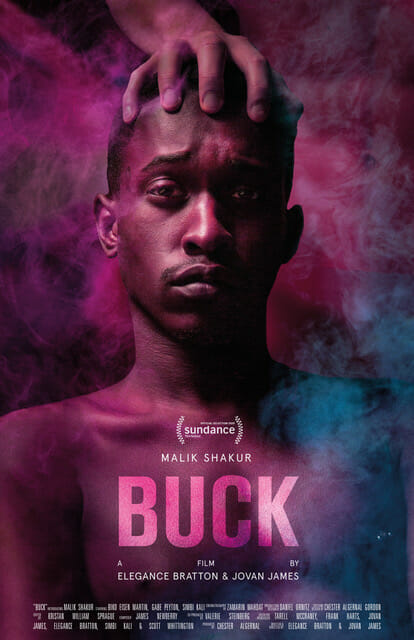 Elegance: The Inspection tells the story of Ellis French a young homeless man who joins the Marine Corps in order to change his life but must conceal his attraction to his drill instructor to survive boot camp. The film is set during the troop surge during the War on Terror in 2005, the last years of Don’t Ask Don’t Tell. It’s loosely autobiographical. I spent ten years homeless after my mother kicked me out for being gay. I joined the Marines and that is where I became a filmmaker. This film is about the necessity of each and every human being. Our message is, “Together we are strong, and divided we are weak.” Going back in the closet was tough for me, but I am grateful for that time. I have deep meaningful relationships with so many types of people I would never have met if I didn’t serve my country. Some of these folks are Trump supporters. Because of our common service we always have a middle ground. In times of crisis, we realize that our shared humanity is bigger than our individual politics. The United States is at odds. Half of us believe one thing and the other half something else. In the Marines, we learned that no troop can be left behind. No matter how compromised or seemingly burdened, Marines have a duty to one another to protect and save one another. If we want to fix our country then we must find ways to reach one another. This is a film that will help our country because it will help to impart this valuable lesson. The script is ready for production. At the moment we are meeting with some of the best people in Hollywood to determine the right home. We look to begin principal photography in Fall 2020.
Elegance: The Inspection tells the story of Ellis French a young homeless man who joins the Marine Corps in order to change his life but must conceal his attraction to his drill instructor to survive boot camp. The film is set during the troop surge during the War on Terror in 2005, the last years of Don’t Ask Don’t Tell. It’s loosely autobiographical. I spent ten years homeless after my mother kicked me out for being gay. I joined the Marines and that is where I became a filmmaker. This film is about the necessity of each and every human being. Our message is, “Together we are strong, and divided we are weak.” Going back in the closet was tough for me, but I am grateful for that time. I have deep meaningful relationships with so many types of people I would never have met if I didn’t serve my country. Some of these folks are Trump supporters. Because of our common service we always have a middle ground. In times of crisis, we realize that our shared humanity is bigger than our individual politics. The United States is at odds. Half of us believe one thing and the other half something else. In the Marines, we learned that no troop can be left behind. No matter how compromised or seemingly burdened, Marines have a duty to one another to protect and save one another. If we want to fix our country then we must find ways to reach one another. This is a film that will help our country because it will help to impart this valuable lesson. The script is ready for production. At the moment we are meeting with some of the best people in Hollywood to determine the right home. We look to begin principal photography in Fall 2020.
WHAT ELSE COMES NEXT IN YOUR CAREER?
Elegance: The Inspection, my feature film debut is imminent and it’s gonna be so cool. Jovan, Chester and I are making Buck into a TV series and as a team, we have several really dope projects cooking. On my own, I write 8-12 hours on most days. I have lots of things on my laptop I’m working hard to get to screen sooner than later. I have a fictional TV series about my weed dealer in development. I also have a pretty cool documentary series about queer music history I’m shopping as well. I really admire multi-hyphenates like Lena Waithe, Spike Lee, and Genji Cohen. I am also a big fan of directors like Claire Denis, John Cassavettes, and The Safdie Brothers. I’m building my career in a way that will allow me to explore a wide array of techniques, and disciplines behind telling the stories I’m passionate about. Follow me on Insta if you want to find out more. @elegancebratton
Buck premieres on Sunday, January 26th at the Sundance Film Festival in Park City, Utah. Click here for a schedule of when it shows.

